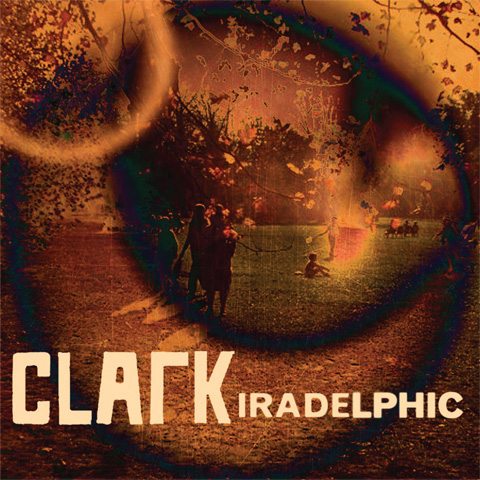MP3: Clark – “Com Touch”
“Henderson Wrench,” the opener to Chris Clark’s latest Warp Records offering, Iradelphic, begins not with the burst of distorted electronica that defined his previous album Totem Flare, but rather with… a fingerpicked guitar. It sounds like a goddamn banjo. Is this the sign of a mellower — dare I say gentler — Clark release?
The Right to Children-aping BBC synths and breathy, distant female vocals of the following track “Com Touch” would seem to answer with a nostalgically inclined yes. “Tooth Moves” combines the two seemingly disparate introductory tones of the album before throwing in a crazed bit of galactic, oscillating Moog noodling, which changes the answer to my initial question with an oddly gratifying flip of a finely-manicured middle finger. That is to say: Iradelphic marks the first time in a fairly long while that Clark hasn’t sounded like he’s trying really hard to make a Warp album. From this newfound effortlessness comes a graceful abandon and willingness to explore an unprecedentedly wide palette of instruments and moods.
“Open,” for instance, finds Clark duetting with London-based chanteuse Martina Topley-Bird over a swirling backdrop of synth flutes and unobtrusive beats. “Ebb and flow of a thousand lonely outlines,” the two repeat in unison, as though to explain the music we’re hearing in real time. It’s followed by “Secret,” this time featuring Topley-Bird harmonizing with herself while that acoustic guitar — ubiquitous across this entire record — strums along with a handclap-enhanced jazzy rhythm. Midway through, Clark’s voice returns as the two chant some sixties-lounge “ba ba bum” refrain. Portishead’s Third seems to be a reference point here, especially in its unorthodox mix of organic and electronic production, though Clark has illuminated that album’s coy shadows with a sepia-toned light and a worldly, almost folk consideration. “The Pining, Part 1,” for example, takes us from desert-crossing guitars and (for a brief moment around the one minute mark) what sound like buried chimes to globules of piano and brassy, orchestral accoutrement. Part 2 of the album-closing trilogy returns to a more comfortably electronic setting, cheekily interspersed with inscrutable chanting and a clipped, repeating sitar sample. I could go on, but frankly, it’s a lot more fun to discover Iradelphic’s manifold little surprises yourself.
And this is where Clark truly succeeds. Iradelphic isn’t quite as busy a record as his earlier works, but this relative restraint only works to make his musical choices all the more resonant and memorable. It’s like Clark has long suffered instrumental ADD and someone’s finally given him a couple Adderall; there’s still lots of genre-hopping present, but it’s more focused an confidently applied than anything I’ve heard from him before. Some will miss the noisy yet charming hyperactivity of albums like Turning Dragon, but I for one welcome the new twists and turns his tastes seem to have made. Iradelphic is the sound of an artist who already had a trademark sound coming into his own while still breaking out of his crackly IDM shell. This seeming paradox never fully resolves itself over the course of this album’s twelve tracks, but that’s a good thing — after less than forty tantalizing minutes, how can we not eagerly await what he whips up next?

